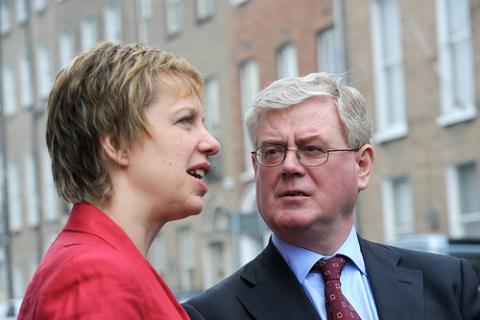Rape victim support services face mounting challenges

The use of support services by victims of rape continues to increase while budgets have been cut by up to 15%.
The revelations of the Ryan and Murphy reports have brought increased exposure to the horrific acts of violence and rape that were perpetrated by the clergy. However, such horrors still continue today across the country.
As the impact of the recession and last December's budget cuts make their force felt in Irish life, Women's Aid and the Rape Crisis Network Ireland (RCNI) face mounting challenges.
(Pictured: Senator Ivana Bacik and Eamon Gilmore TD)
The foremost problem is a lack of resources. While it is difficult to gain absolute agreement on reliable statistics for the prevalence of domestic violence since the recession began, a steady increase in the numbers turning to the RCNI and Women's Aid has been observed.
Dr. Clíona Saidléar, Policy and Communications Director of RCNI, told Politico that it is difficult to tell whether this increase may be due to higher levels of domestic violence or higher levels of disclosure.
However, she said the RCNI were particularly worried about high levels of sexual violence perpetrated against teenagers. "This area is hugely minimised [in media discourse], especially when alcohol is a factor," said Saidléar. "As yet we have faile
d to figure out boundaries, a language to talk about it and the statutory infrastructure to respond to it."
A recent report, entitled 'Rape and Justice in Ireland' and published in December 2009, highlighted the failure of the justice system to protect rape victims. According to the report, the less likely form of rape (by a stranger) is often dealt with correctly but the more likely form (by someone known to the victim) is less likely to be prosecuted.
Senator Ivana Bacik, Labour Party Seanad Spokesperson on Justice, Equality and Law Reform, recently pointed out that incidents of domestic violence are rarely isolated occurrences but that criminal law is designed to deal with one-off incidents. As a result of this, she said, "it can be difficult to apply [criminal law] in the context of an ongoing abusive relationship".
"The statistics kept by the Gardaí, for example, do not identify repeat call-outs so it is impossible to know how many recorded incidents of domestic violence involve the same individuals," said Bacik.
In 2008 1,840 people used Rape Crisis Centre counselling services. This was an 8.4% increase on 2007 and does not include helpline calls and support. In contrast, in 2009 most centres of the RCNI received cuts of 3-5%, although the highest cut was 15%.
Women's Aid said that over 15,000 incidents of physical, emotional, sexual and financial abuses were disclosed in 2008 to their freephone helpline. Many of these were reported by women suffering abuse prior to the recession but, since the recession began, these women are experiencing abuse more frequently and more severely.
Internationally, Ireland was ranked lowest out of 21 countries in a study which assessed conviction rates in 2004. At the time, there was disagreement over these figures. However, a more recent study, 'Different systems, different outcomes? Tracking attrition in reported rape across Europe', conducted by Child and Woman Abuse Studies Unit (CWASU) in 2009, shows that the reporting of rape in Ireland between 1977 and 2006 rose by 627%. This figure is higher than any of the other 23 countries listed while Ireland was third from bottom in conviction rates.
The report said: "[I]t is clear that over the period in question the number of prosecutions has not increased in line with the increase in reports. Indeed, given the fact that the earlier figures are underestimates, it appears that the number of prosecutions has increased only slightly over the period."
The vast majority of victims were female, and 78% of victims had consumed alcohol around the time of the incident (one of the highest proportions in Europe) while 10% had consumed drugs. All suspects were male, and 88% of them had consumed alcohol at or around the time of the assault. Only 20% of suspects were strangers to the victim.
Paul O'Mahony, who conducted the research on Ireland in this study, told Politico: "The comparative picture for Ireland is not as bad as it looks because many of the other countries are hiding a worse situation behind inadequate statistics. The increase in reports here has led to a considerable decline in conviction rates because a far lower percentage of reports are actually prosecuted."
Nevertheless, in his opinion, "less than one in forty actual rapes is appropriately punished through the criminal justice system".
'Different systems, different outcomes? Tracking attrition in reported rape across Europe' may be accessed though the CWASU website.
RCNI freephone: 1800 77 88 88
Women's Aid freephone: 1800 341 900
